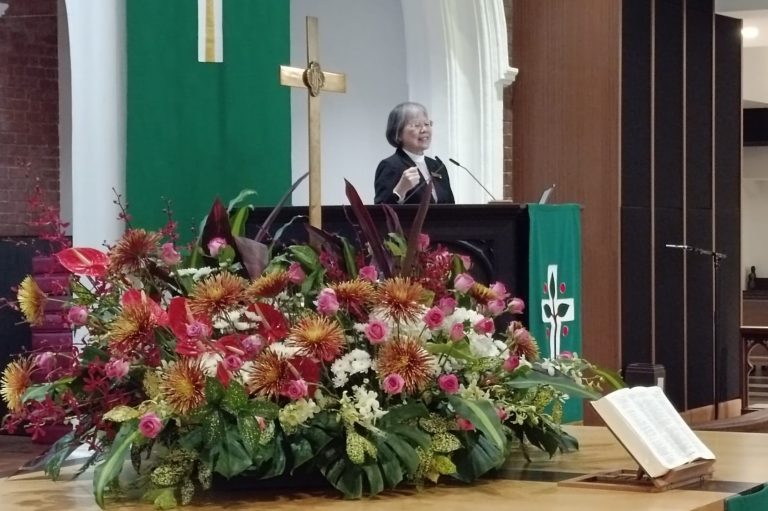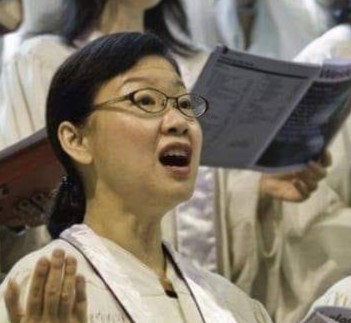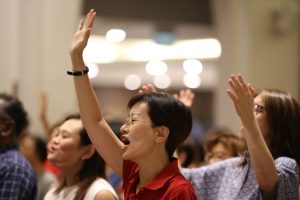Is arranging flowers just an aesthetic activity to enhance the ambience and beautify the environment of sacred spaces? What do flowers arranged by servants of the Lord in church mean to you when you see them placed around the church during worship services?
Can we see God’s hand in a mundane activity such as floral arrangement?
Flowers are an integral part of most churches. Flowers, a gift of nature from the Lord, give beauty, hope and solace and enhance the environment of the church.
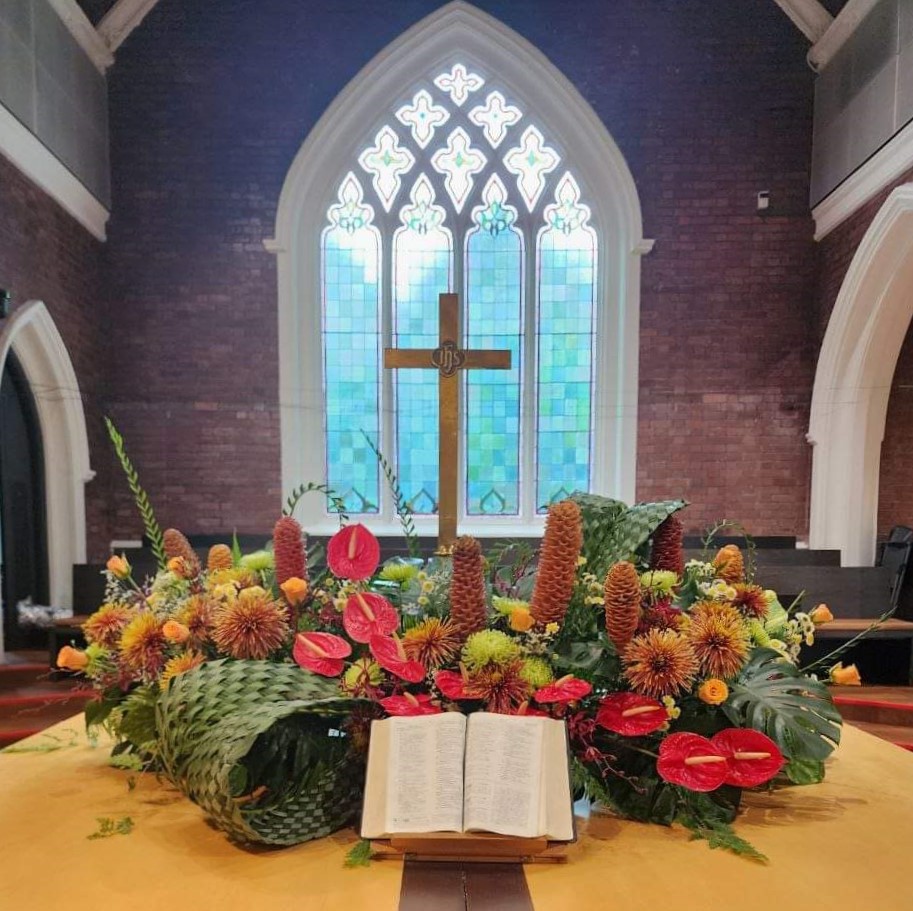
There is a quiet and peaceful joy in arranging flowers, a behind-the-scenes ministry in our church. In serving through floral arrangement, we also give back a gift of beauty to the One who created us.
To many of the Wesley Floral Fellowship (WFF) members, arranging flowers is like a fervent prayer, a nourishment of the soul.
A regular member of the team Maureen Wong, who had been touched and ministered to by the floral ministry some 30 years ago, shared: “Whenever I hold God’s creations in my hands, I know I am just the instrument to use the flowers to serve and love others. Sometimes, through a simple arrangement, members of the congregations may discover its beauty and fragrance as a reminder of our glorious God’s love, joy and peace.”
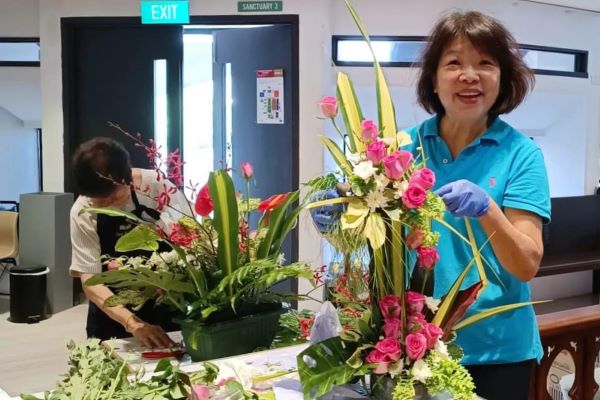
It is the members’ way of spending every Friday, personally worshipping God, contributing to the preparation of the house of the Lord for worship, and giving and receiving fellowship, support and guidance to each other in a Christian community.
In the floral ministry, members’ skills range from complete beginners to professionals. Although some members have undergone courses and formal training, most members have not. They avail their time and their lives to learn under the tutelage and guidance of team leaders and experienced seniors.
If you ask any member, all will speak of knowing that God is guiding their hands as they communicate silently to the Lord in the weekday quietness of the church sanctuary.
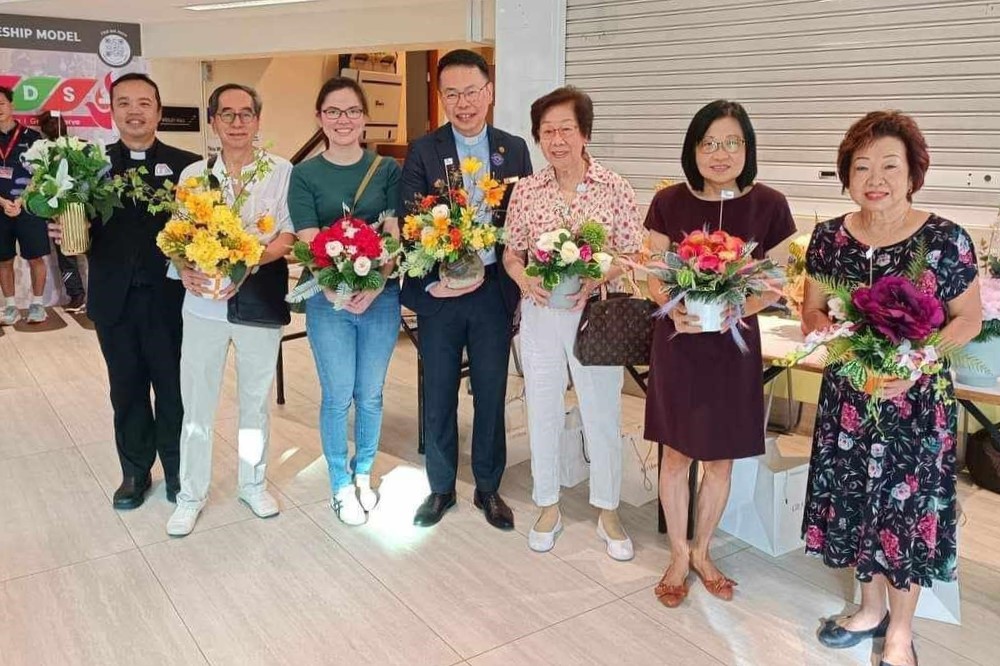
Some of the basic principles guiding the members of the Wesley Floral Fellowship are:
Giving all Glory to God
The floral arrangements are to give glory to God and to His Name. They enhance the worship experience for worshippers and are a form of doxology to our Lord.
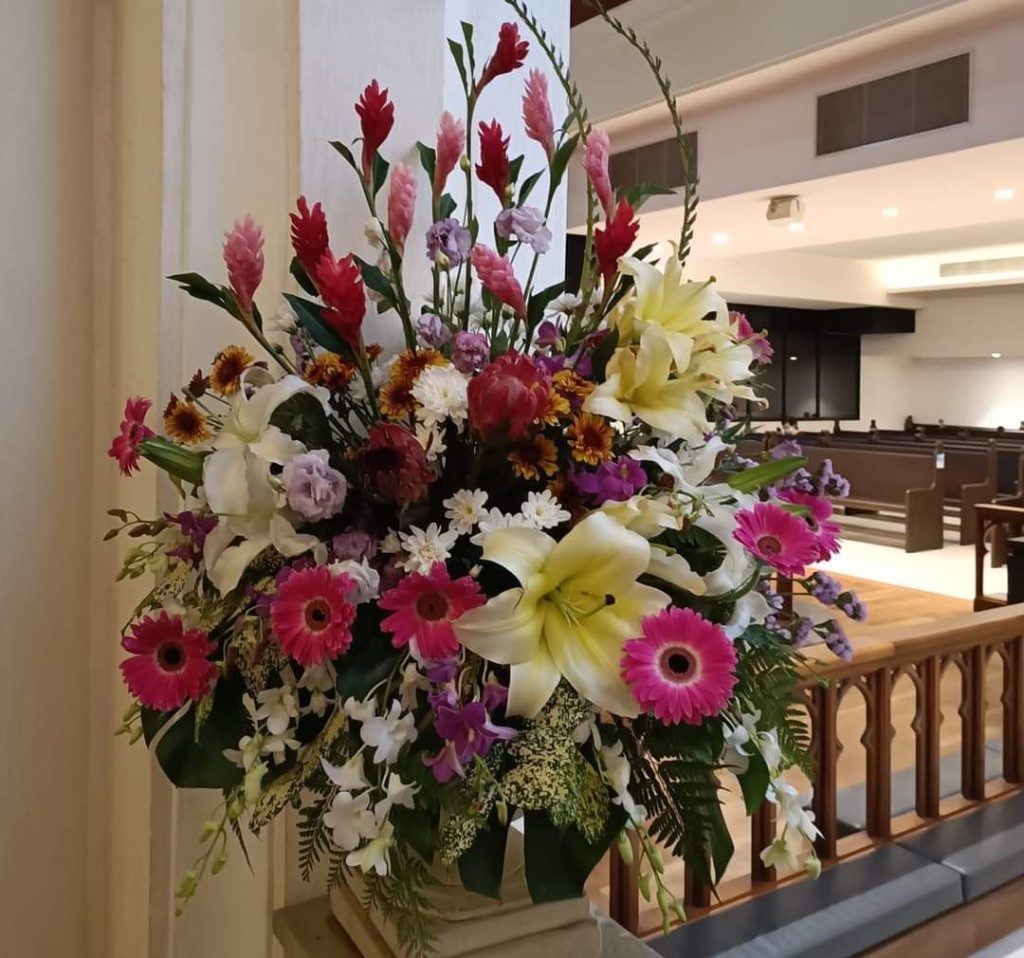
Acknowledging the Creator
Flowers and nature are a gift of our Creator God. Just as mankind is created by God, we always remember that all good and beautiful things come from the Creator, who called His creations “good”. We, and flowers, are the physical manifestation of God’s creation.
“God didn’t have to make flowers or incorporate beauty in the earth,” said Maureen.“ But He did. When I arrange flowers, my raw materials are His creation, and I get to bear His image as the one and only cultivator.”
Bringing living flowers into the sacred worship space also makes our sacred space more alive, authentic, and warm. Besides their purchases, some WFF members also make use of the greenery from their homes or use foliage from the church gardens.
Observing Reverence in the Sanctuary
Floral arrangers have a very special privilege. This is the privilege of working in a sacred space. All Wesley Floral Fellowship members are mindful of this privilege. They are always reverent, prayerful and quiet. And especially at the altar table, where believers partake of the elements of Holy Communion monthly.
Most days, we also enjoy the beautiful music of the church organists who have scheduled their practices on the same day!
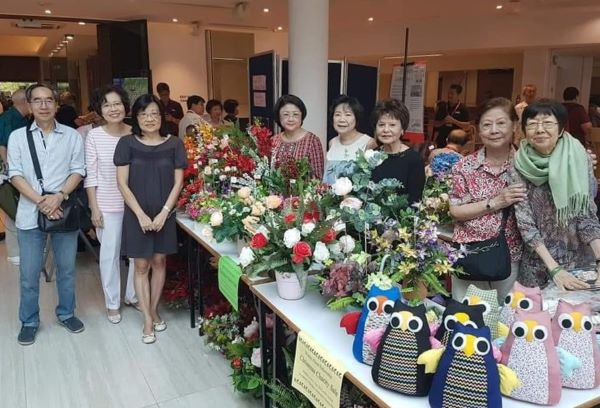
Enhancing but not overpowering
Flowers are meant to enhance the worship experience and the sacred spaces. They guide the eyes towards Creator God. One of the principles is that the altar flowers never go above the arms of the cross. If the arrangements are too large, they will visually overpower the cross. God, and God alone, is the focus and subject of our worship.
Organised, not random or chaotic
In floral arranging, the handlers are mindful of the symmetry, mass, focal point, colour and proportion.
At the same time, there is room for personal expression, artistry, and innovative arrangement that brings out the beauty of the arrangement.
Observing Seasonality
Subject to the availability of floral material, seasonal colours complement the liturgical calendar. Thus, the use of pale pink or white lilies at Easter, poinsettias at Christmas, or the use of complementary colours for the different seasons of the liturgical calendar.
Inspiration starts from the liturgical calendar but is extended by what is on sale at the floral supplier, discussions among members, whether there is a wedding and ideas from magazines and books.
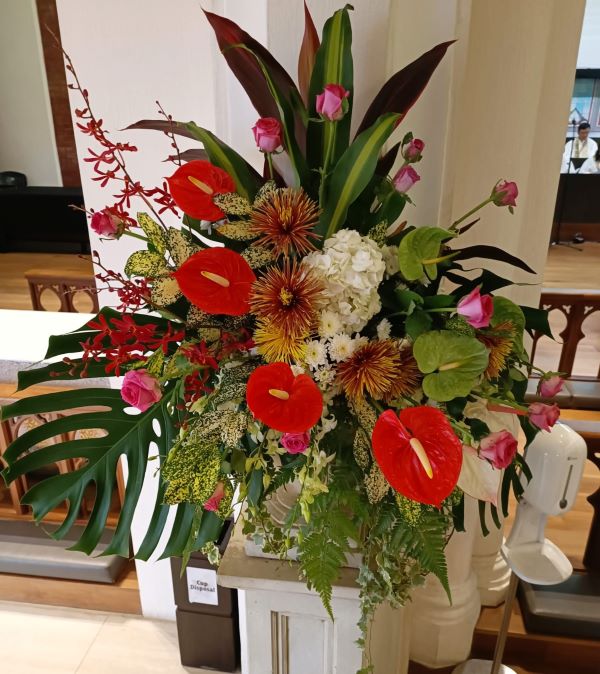
Cleanliness, next to Godliness
All members know that a great deal of heart and humility is involved whilst arranging flowers. Cleaning up after ourselves makes everyone’s work much easier and more pleasant.
A very large portion of members’ time is spent picking up stems, leaves, petals, and debris from the floor, sweeping and cleaning up, pouring away buckets of water, and tidying the altar area. Members are also grateful to the cleaning staff who always help with the heaviest tasks of carrying buckets and mopping and disinfecting spaces after us.
Personal, yet communal
Each floral arrangement is a unique and sacred expression of the person creating it. The very act of designing and arranging is putting something of ourselves, our own being, into the offering. We offer the flowers, ourselves, and our lives to God.
For the three or more hours of preparing, conditioning and arranging the floral offering, we commune with our God.
The delight in arranging flowers has been with one member, Cassandra Leung, since she was a little girl: “I had watched my mum do Ikebana tabletop arrangements. When I was older, I was eager to be rostered to do floral offerings to the Lord myself.
“Floral arrangement is not just a physical aesthetic activity. Through learning to pray and allow God to use my eyes and hands, I am connected to God. It is my form of worship. An expression of creativity like how God created all things beautiful in the six days and He was pleased.”
“It is my joy to share the work to fill the Lord’s house with love and serenity, and an avenue to prepare the hearts to offer worship and receive His Word at services,” she added.
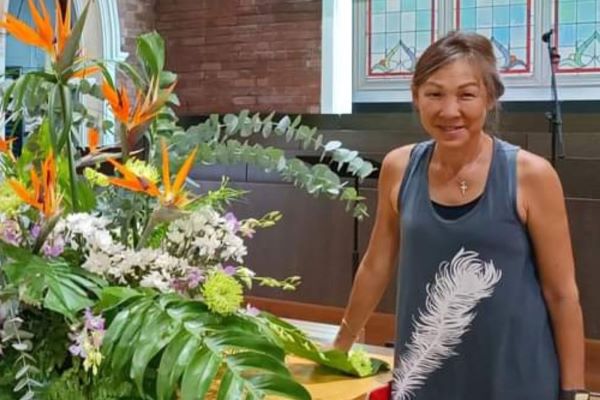
Floral offerings enhance the worship experience for everyone. Their colours, fragrance, beauty and presence draw attention to the altar and the cross. Foliage and flowers bring nature into the house of the Lord, reflecting our Creator God.
Floral offerings are also an important liturgical art form, in service to God.
Worshipful music, the stained glass, the altar, and the flowers, all come together, the congregation celebrates oneness with God.
So, the next time you come to church for worship service, look out for the floral offerings and see that more than just a bunch of cool and beautiful flowers and leaves, they are also an expression of worshipping the Lord for the hands that arranged them!
As one of the Wesley Floral Fellowship volunteers Felicia Toi puts it beautifully: “Our God deserves all the honour and glory from, and through all He has created. The use of flowers in the sanctuary speaks of our respect and adoration to Him. It is a constant reminder that God’s presence fills the sanctuary amid His people.”
About the Wesley Floral Fellowship
The Wesley Floral Fellowship (WFF) is a sub-ministry of the Worship & Music Ministry. Led by chairperson Chia Pee Keng, it currently has 45 members, all rostered to put together the floral offerings every week. Occasionally, the WFF also dedicates additional hours to create special floral arrangements for significant occasions like Easter, Christmas, church anniversaries, baptisms and weddings. WFF was started in 1945 by Mrs Gnana Thevathasan, after the Japanese occupation.
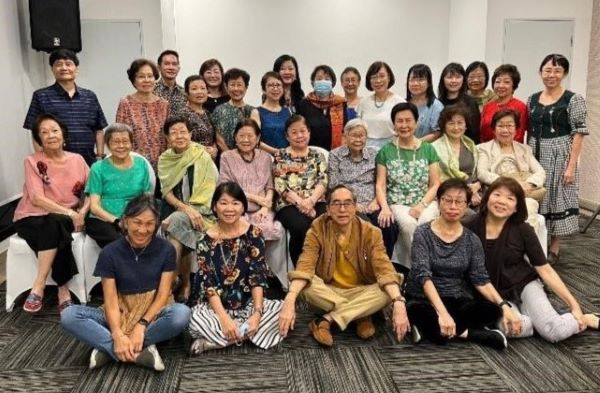
Photos courtesy of Wesley Floral Fellowship
Read also: God has given everyone our own unique gifts: What is your superpower?

